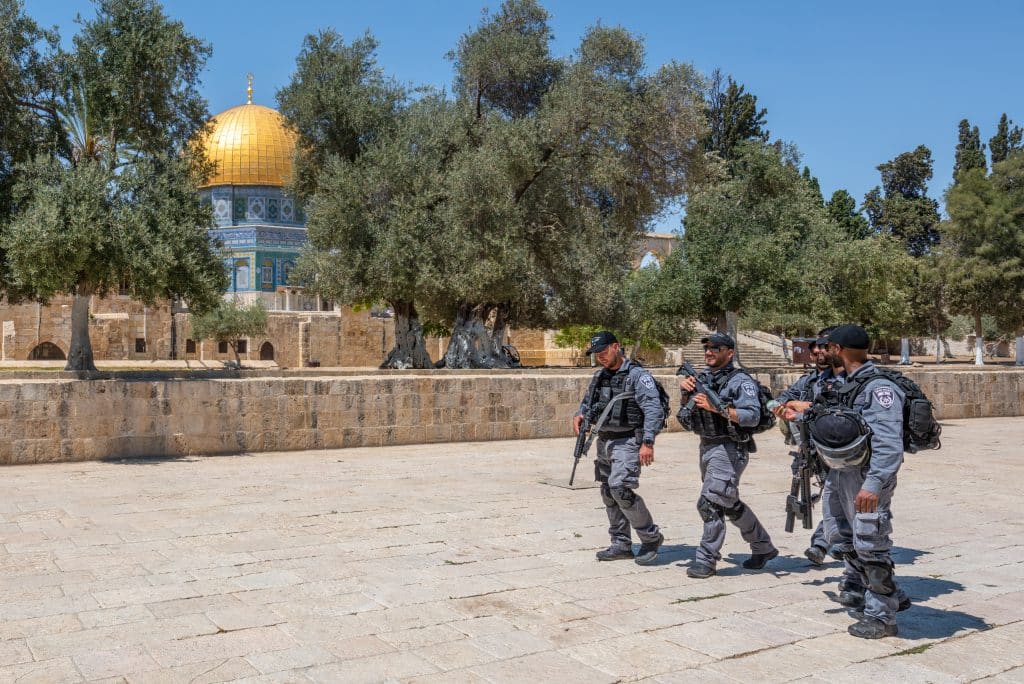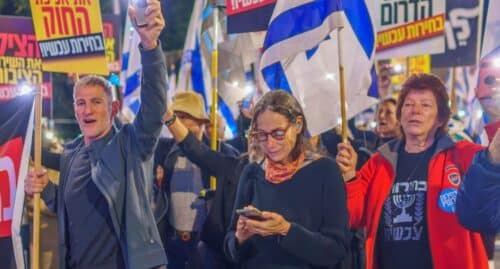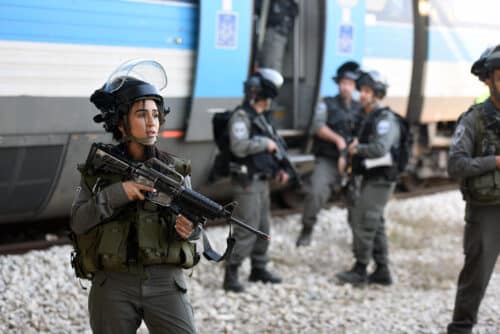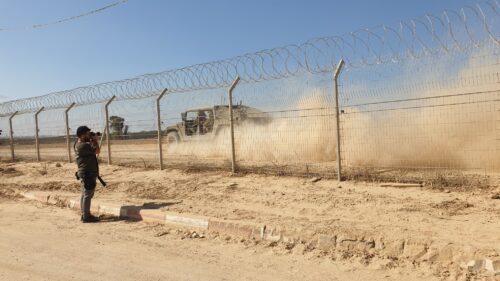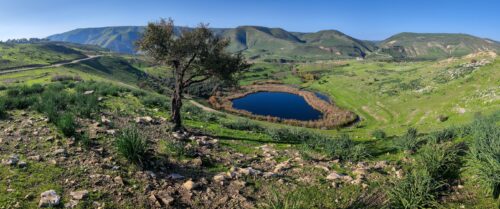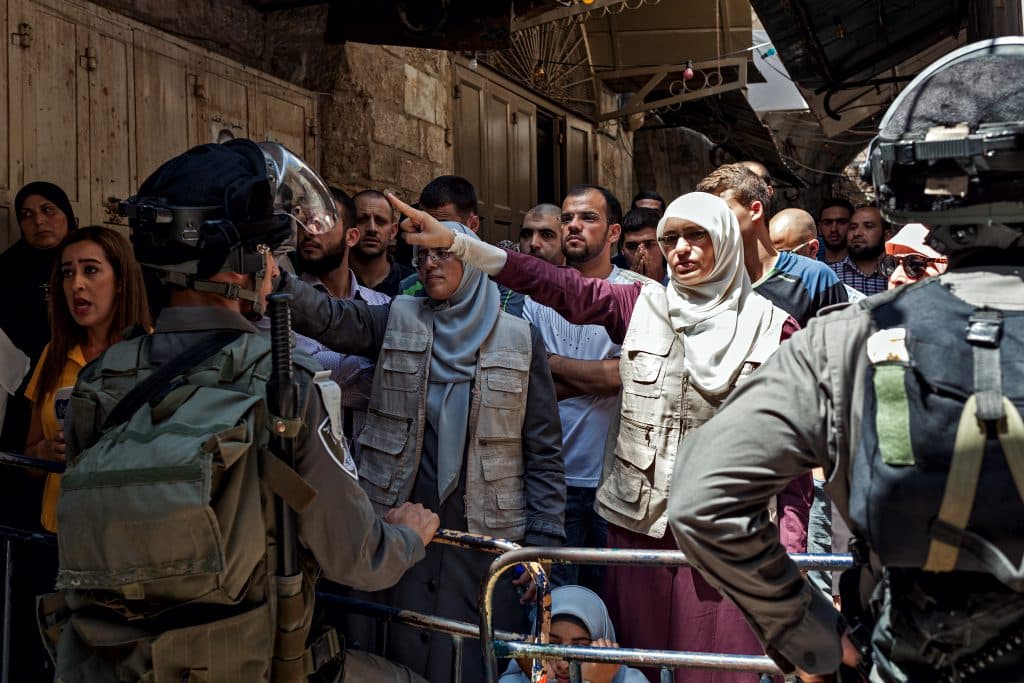
The IDSF’s ultimate goal is to ensure Israel’s security for generations to come. Two central understandings underpin this goal: The first is that the security of the State cannot exist in a vacuum; rather, it depends on an extensive system of political, economic and social factors. The second understanding is that in order to make informed decisions, it is necessary to build a broad strategy that is based on the past and looks to the future.
These understandings have led the IDSF to formulate a clear national vision based on in-depth research and touching on all the areas that shape Israeli society. In this article, Colonel (Res.) Ilan Dikstein focuses on establishing a national guard – an idea that has been around for a long time but which has not yet materialized.
Background – From Ordinary Criminality to Governability Issues
The State of Israel has for many years now been coping with internal security issues. These include criminal activity, terrorism, agricultural terrorism and so forth. Officialdom has shied away from naming it explicitly, for political correctness reasons, but it is common knowledge that it is the Arab and Bedouin population that has been at the heart of these activities. Quite often the motives are purely of a terrorist nature.
This trend saw a major uptick, which the country endured painfully in the events that preceded Operation Guardian of the Walls. In May 2021, riots broke out in hundreds of locations nationwide. These included arson, stone-throwing and public order violations. Three people lost their lives in these riots. Hundreds were injured and property damage was estimated at tens of millions of Shekels. According to the security authorities, some 90% of those involved in the riots were Israeli citizens from the Arab community.
These riots shook the establishment, which realized that there is a severe governability issue – that this was a security issue for all intents and purposes requiring a targeted response. This is when the idea was raised of setting up a national guard, which would be based primarily on volunteer citizens, and which would serve as an additional defensive layer on a regular basis and in emergencies.
Since 2021, this notion of a national guard has been taking shape, but it has not yet been acted upon. The delay is due, among other things, to various disagreements as to the exact nature of the guard. Such questions as: will the guard be comprised primarily of volunteers or will it be based on serving personnel? Will the guard replace the Border Police or will it operate alongside it? Will the guard be accountable to the Israel Police or to the Minister of the Interior? And also: where will it operate? What will be its mandate? How much authority will it be given?
Despite the disagreements, most decision-makers are already convinced that one way or another, such a national guard has to be established to be charged with internal security with special emphasis on incidents of a terrorist nature. Should another outbreak like Guardian of the Walls occur, and in particular these days when we are engaged in a war on our southern border and also on our northern border – we might find ourselves facing a scenario for which we are simply unprepared.
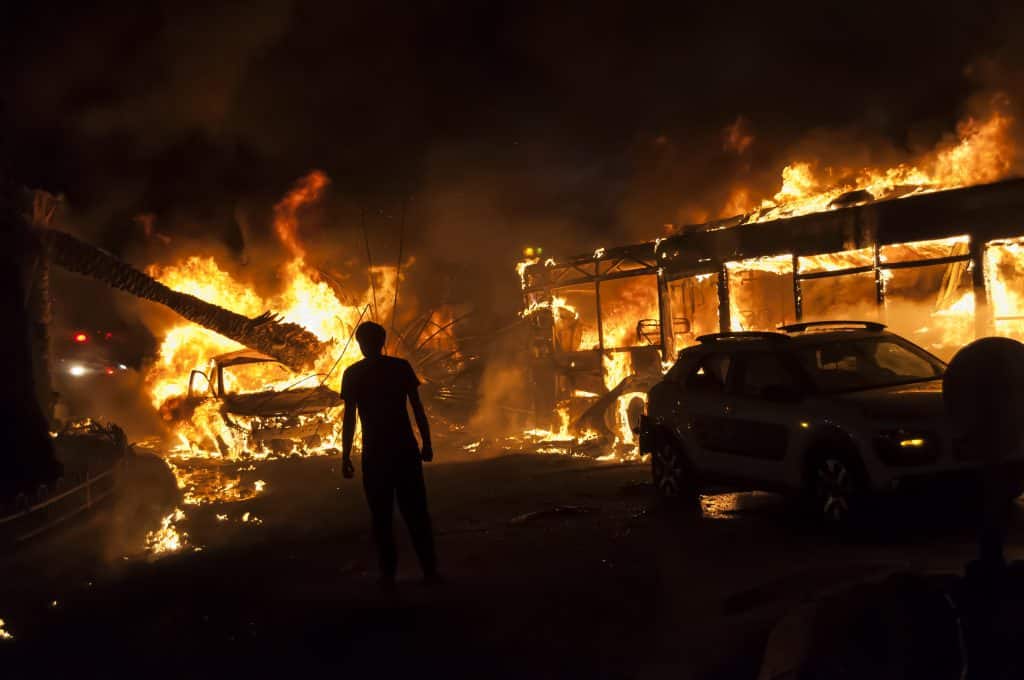
Colonel (Res.) Ilan Dikstein: The Vision for a National Guard
Stare the Problem in the Eye
Current state:
The State of Israel and the police balk at outlining the root of the problem, even though it is common knowledge that there is one sector here that systematically harms another sector of the population. In many cases, cases of theft, harassment or sabotage are committed not purely in the criminal realm. They frequently have a terrorist dimension, reinforced by a Jihadist ideology. Moreover, the perpetrators of the criminal activities could subsequently, just as easily, repurpose their acts in support of terrorist objectives. Similarly, the weapons used in criminal offenses can be redirected toward the Jewish population in a terrorist incident, meaning there is a dangerous escalatory trajectory here.
We have got to realize that Israel’s Arabs are living inside our country without a fence to restrict their movements, while among them there are many groups which identify with the Palestinian nationalist ideology and are hostile toward the Zionist endeavor. Our enemies from outside are fully aware of this and are therefore supporting these groups materially and financially in an effort to subvert them against Israel. Thus, a new battle front has formed in Israel – only this time the front is internal. Whether in peaceful times or in emergencies, this front could transform into an active battlefront in its own right, as was the case in Operation Guardian of the Walls, and during wartime it could also become yet another theater of combat in addition to the rest of the battlefronts. Despite these dangers, we still persist in skirting the issue rather than seeking a real solution for it.
Ideally:
- Define the issue: The time has come to stop hiding behind political correctness and state outright that there is a serious problem of criminality and terrorism coming from substantial groups within the Israeli Arab population. This being said, we are fully aware that a large proportion of Israel’s Arabs are loyal, productive citizens. These activities cause an acute governability issue across large swathes of the country.
- Define the specific attack scenarios: the homeland front within the State of Israel is a battle front for all intents and purposes and has to be treated that way. These specific attack scenarios along this front have to be outlined, and the threats we are facing have to be understood. These threats include sabotaging bases deep inside the country, loss of governance within the Arab sector, sabotaging of national infrastructures, blocking of critical traffic arteries, attacks against Jewish settlements, rioting inside mixed-population cities, and more. Besides this, one must take into consideration that this front can heat up on its own or concurrent with other fronts as part of a multi-theater war.
- Operate during peaceful times, prepare for emergencies: The national guard has got to prepare itself and maintain readiness for a wartime scenario, although the bulk of its work would be done during peaceful times. This routine work serves two important goals: training the forces for an emergency or for war, such that when needed they can be called upon and will be sufficiently well-trained. The second goal is to nip in the bud the threats in the field, thereby reducing and even preventing the problems that might erupt in emergencies or during a war.
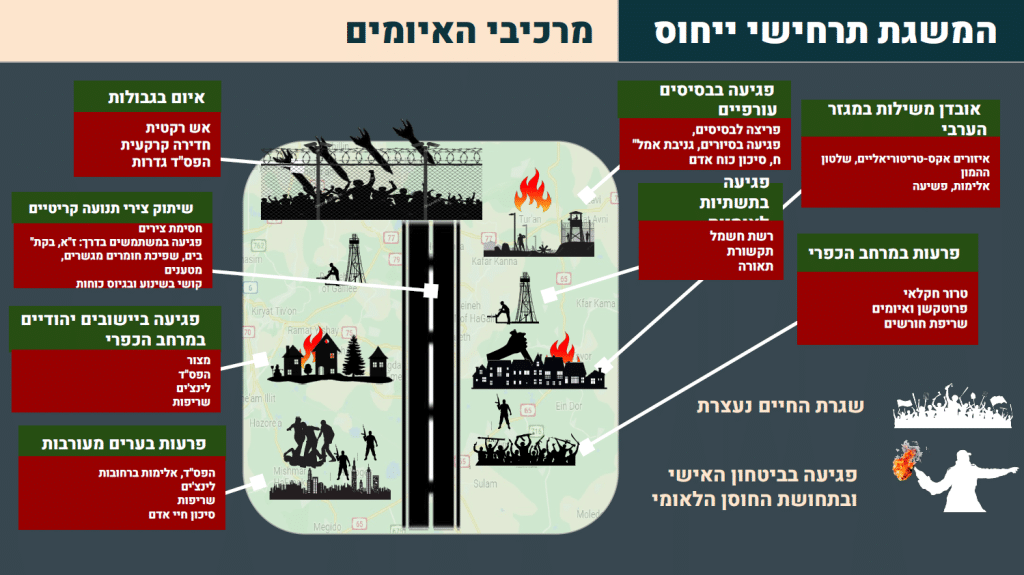
Establish a professional, specially-trained force
Current state:
Internal Security is currently assigned to the Israel Police, however in emergencies the police is not always prepared in terms of capabilities and manpower, in which case the IDF has to intervene as well. An IDF intervention in internal security issues raises two main issues. First of all, this is an immense burden on the IDF, which in any case has multiple fronts to attend to. Secondly, if the IDF fights against our own citizens, a complicated balance is struck, which might jeopardize our democracy.
It is worth noting that IDF intervention in matters of internal security is due not only to the need to protect public security, it is also due to the need to facilitate the continued proper functioning of the military itself. Israel is a small country with a small army. Therefore the very same forces are needed for operations along various sectors. Redeployment of IDF forces from one theater to another is done along internal routes in the country’s heartland. Should there be civil unrest leading to routes being blocked or barricaded, or should access to military bases be obstructed – as was the case with the Nevatim base during Operation Guardian of the Walls – the IDF will have difficulties in carrying out its missions. This reality is a major concern for the IDF. It forces the IDF to allocate forces and resources for dealing with a situation that should not be part of its responsibilities.
Ideally:
- Free the IDF of internal security: the IDF should be freed from any involvement in internal security so as to enable it to focus on its other responsibilities and to prevent friction between the military and the civilians.
- Find a proper solution for all internal security issues: in order to enable the IDF to completely disengage from dealing with homeland front issues, organs need to be created, which will be ready, both in terms of capabilities and in terms of order of battle, for any criminal or terrorist scenario that might destabilize the home front.
- Professional national guard: since the Israel Police alone cannot cope with all of the internal security specific attack scenarios, a professional national guard must be established, which will be comprised of skilled soldiers in the regular army and reservists. It is important to understand that the original suggestion to set up a volunteer-based guard is inadequate. First of all, professionalism and commitment are better when an organization is not based on volunteer manpower. And since this is a highly-sensitive arena, in which any miscalculation could result in injury, one cannot compromise on unskilled forces. Secondly, in an emergency, most of the volunteers would be going to their army units, leaving the National Guard short-staffed.
The Border Police as a National Guard – Redefining the mission, the sector and the nature of its work
Current state:
Besides the IDF and Israel Police, the Border Police is also a force operating inside the country. On the one hand this is a semi-military force but on the other hand it is under the command of the police and its main occupations are on issues of internal security. The Border Police’s status makes it a reserve force, operating in a “twilight zone”, where it is called in to help with a wide range of missions without having a clear zone of authority and without specializing in any particular sector or in any specific mission.
Ideally:
One of the ways in which the issue can be dealt with efficiently is to turn the Border Police into a National Guard. Such a move would require a few changes:
- Rename the Border Police: the name this force has been given – Border Police – is antiquated, since it has long ago ceased to reflect this organization’s role. The IDF is the force that effectively polices our borders. For this reason, the name “National Guard” is more appropriate.
- Define responsibilities: A national guard force needs to have clearly-defined responsibilities with a list of missions and goals according to which it is measured. According to the job description, the Guard would attend to matters of internal security, focusing on terrorist crime and criminality committed within Arabic society. Among its occupations would be counter-terrorism, weapons smuggling, agricultural terrorism and racketeering. This definition would also be significant in the fight against crime within the Arab sector. This is an issue the State of Israel is committed to dealing with, first and foremost for the sake of the well-being of the Arab sector itself.
- Define a clear sphere of activity: The new Guard’s operations would be confined only to the territory of the State of Israel, leaving the Judea and Samaria or Gaza territories completely out of scope. Furthermore, the forces should be trained in accordance with specific regions of activity. The division into regions, or sectors, will serve as a force multiplier, since the moment the forces specialize in a specific sector and in a specific type of activity, they will be much better prepared for dealing with the challenges as they arise, with a smaller order of battle.
- Proactive rather than reactive: The Israel Police is mostly reactive – a problem arises, it steps in to solve it. The IDF, on the other hand, engages more in proactive and preventive action so as to strengthen deterrence and prevent escalation. The National Guard will also have to adopt this practice and it will need to take proactive measures to strengthen internal governability.
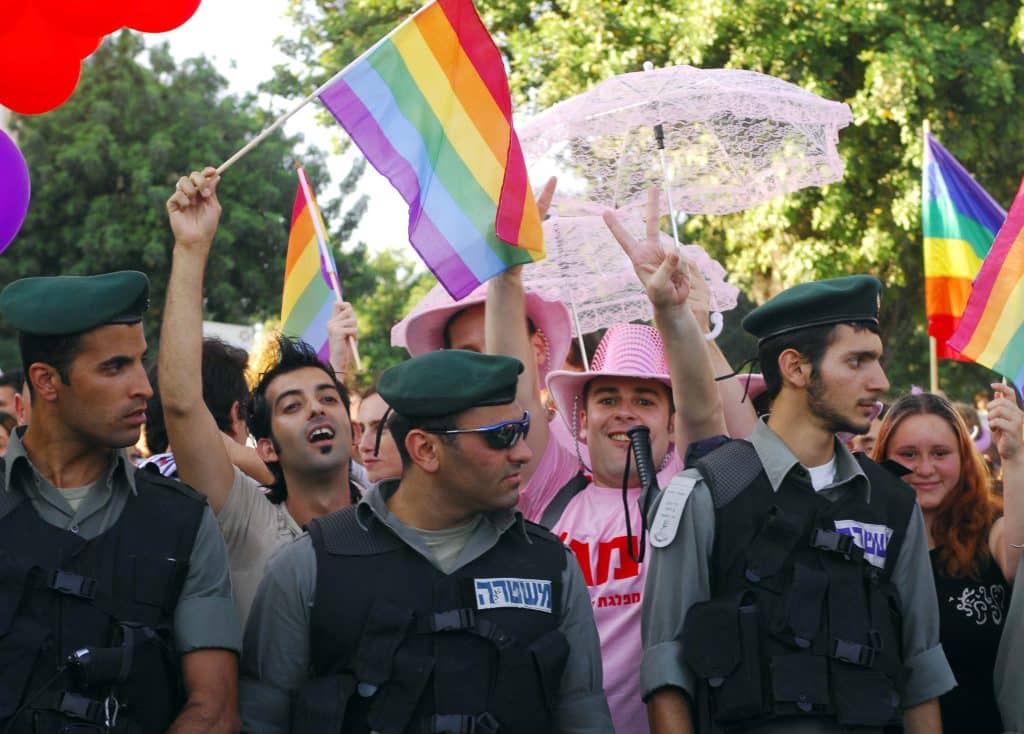
Solving the issue of the National Guard’s allegiance
Current state:
One of the factors delaying the establishment of a national guard is the issue of whom it will belong to. Some believe the national guard should come under the Israel Police just as the Border Police is today. Others believe it should operate as a separate entity answerable directly to the Minister of Public Security. Both approaches have their merits, however so long as this issue is not resolved, it is impossible to move ahead and set it up.
Ideally:
- In the beginning – place the National Guard under the Israel Police: at least in the first few years, the National Guard would best function under the police the way the Border Police does at the moment. This would avoid political pushback and would expedite the setting up of the Guard. It would also make sure the police remains in charge of internal security issues.
- Hedging and differentiating the National Guard: despite its assignment to the police, the National Guard ought also to be hedged in terms of its missions and in terms of the manpower and resources allocated to it. Such hedging would prevent the police from using it as a reserve force that can be deployed at the police’s discretion. It would enable the Guard to operate freely within its purview.
- Later on – consider reassigning the Guard to the Ministry of Public Security: after several years, it will be possible to re-evaluate the situation and consider whether to break the National Guard away from the Police and place it under the direct responsibility of the Ministry of Public Security. It is important to emphasize that also in such a situation, the Israel Police would remain in charge of internal security.
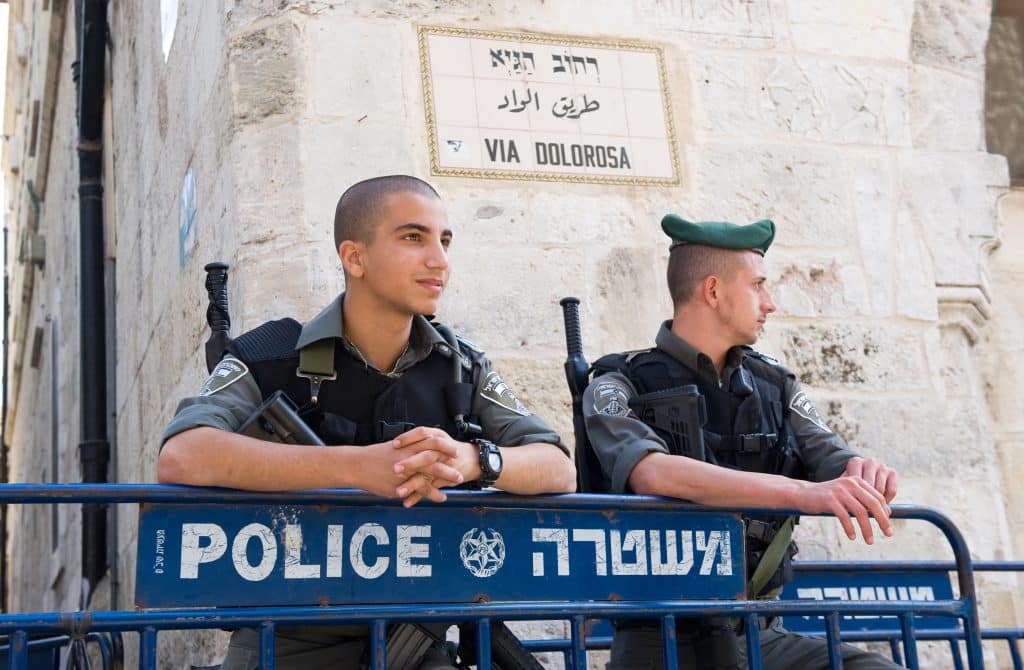
Force-building – gradually and wisely
Current state:
Considering the Border Police, the force out of which the National Guard would probably be coming – one can see several problems. First of all the Border Police staff is short on power, its intelligence capabilities are inadequate, and it lacks a recruitment organization commensurate with its needs. Secondly, the Border Police operates in company formations. It is unaccustomed to working in battalions or brigades. Thirdly, manpower utilization in the Border Police is not optimal – this applies both to the regular force and to its reservists: nowadays there are many Border Police reserve companies, but these hardly ever show up for reserve military service days and are therefore inadequately trained. Moreover, the Reserve Military Service Law is not applied to the Border Police reserve force the same way it is applied to the IDF reserve military service force.
Ideally:
- Strengthening the staff: The goal is to turn the Border Police headquarters – which will eventually become the National Guard headquarters – into a body that is not only a force builder, it should also apply the force. In other words, it should be a body with clear responsibilities and it should be amply capable of carrying out its missions. To achieve this, the Guard’s headquarters should be reinforced through allocation of resources such as information systems and Command & Control systems; its intelligence gathering capabilities must be improved, including through arranging collaboration with the GSS, and a recruitment organization must be set up to enable large-scale recruitment of high-quality manpower.
- Scaling up the order of battle: manpower is the most important resource. It will take a cross-system thinking process to scale up the order of battle serving in the National Guard. For example: to extend conscript service back to three full years, thereby enabling allocation of more soldiers to the National Guard. Another measure could be to recruit populations that are currently outside the circles of recruitment for various reasons – for example the Haredi community, assuming they would be more comfortable serving in a Border Police-styled force, and in a force that would make it easier for them to maintain their specific lifestyle. Besides that, reservists from IDF combat units could be brought in for service in the National Guard. Besides these measures, it is also important to ramp up the National Guard’s image among the general public, to offer preferential terms for their service so as to attract high-quality, highly-motivated manpower.
- Planning for force multipliers: besides scaling up the order of battle, the brigades and battalions that will make up the National Guard must also have additional force multipliers, which would enable even a relatively small force to achieve a lot. Part of the force multipliers have already been mentioned here. These include recruitment of high-quality manpower, a comprehensive training program, specialization in a specific sector, improvement of the surveillance capabilities and of the Command & Control capabilities, strengthening of the intelligence network etc.
- Stepwise progression: this force must be built up gradually, in three main phases – short-term (one year), intermediate-term (three years) and long-term (five to seven years). It is advisable to begin with a single region, to settle in and only then to expand to the rest of the regions. The intention is that at the end of the process, each region will have its own specialized brigade made up of a regular-army battalion and several reserve battalions.
- Optimal utilization of the manpower: the Border Police reserve companies should be converted into reserve companies of the National Guard. Besides that, the Border Police’s reserve companies should be consolidated, they should be armed and trained, exactly the way this is done in the IDF.
- Volunteer layer: the regular units and the reserve units in the National Guard can be augmented by volunteer civilians, who will be able to reinforce the units during peacetime and in emergencies. The volunteers must also be organized in proper units and they have to be well-trained. It should also be possible to place the volunteers by their residential address, such that they will be positioned to promptly respond to a call within their region. This being said, one should bear in mind that in an emergency and also in wartime, most of the volunteers will contact the regular units to which they are assigned, such that this force can only be regarded as a complementary force. When setting up the volunteer network, one can rely on existing networks such as the alert squads that defend settlements, intervention units and various urban battalions.
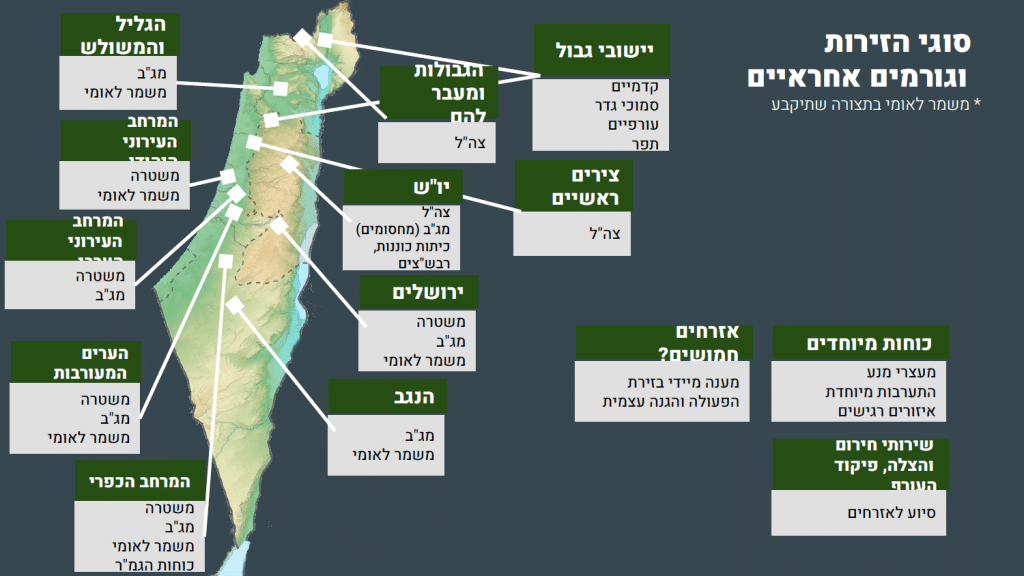
Set up an interministerial committee
Current state:
As mentioned earlier, the idea of setting up a national guard arose already in 2021 and, since 2023 it has been worked on in government committees – however the force has yet to materialize. Currently the idea is under discussion mainly in the Ministry of Public Security although it is important to understand that this is a cross-systemic issue requiring a multidisciplinary policy.
Ideally:
- An interministerial committee should be set up, which would include representatives of the Ministry of Public Security, Ministry of Defense, Ministry of Finance, Minister of Justice and any other relevant stakeholder. This is the only way to form a holistic policy and to succeed in realizing this plan.
Don’t ignore, take action: summary and conclusions
Internal Security is officially the responsibility of the Israel Police, however as we often see, the actual solution is provided by the IDF. This is because there are criminal activities taking place which are of a terrorist nature, requiring a military-style response. This is not something the Israel Police can provide.
The current state of affairs, in which the IDF is virtually the only executive body in Israel, is untenable. It is wrong from the operational standpoint, from the legal standpoint and from a democracy standpoint. Ideally, the IDF should be unburdened of any responsibilities related to solving internal domestic problems. Responsibility for this should be assigned to the police and the National Guard, for which the appropriate resources and tools should be provided. Such a move would relieve the IDF of a considerable load and would enable the IDF to focus on its real mission – coping with enemies from beyond our borders.
The most effective, most efficient way to set up a national guard is to base it on an already-existing Border Police force, which is structured similarly, but to upgrade it and fine-tune its missions. As opposed to the Border Police, which currently serves as a reserve force for the police and for the IDF, the National Guard would have clear authorities with clearly-demarcated sector boundaries. Its mission will be to deal with terrorist-based criminality while focusing on the Arab sector, which is the source of the majority of such criminality.
Also, as opposed to the Border Police, the National Guard will operate within geographic regions, it will be trained to combat in large orders of battle – battalions and brigades – and it will maintain a well-formed, well-trained reserve force. Besides the regular soldiers and the reservists, volunteers can also be included in the National Guard. These will help reinforce the units on an as-needed basis. As mentioned earlier, initially the National Guard will come under the Israel Police, however over time it will be possible to split it off as a separate organization with a clear identity and with its own unique capabilities.
The concept of setting up a national guard has been around for many years but now, with Israel in the midst of a war on multiple fronts, it has taken on an added urgency to the extent that it is imperative that it be implemented without any further delay.
